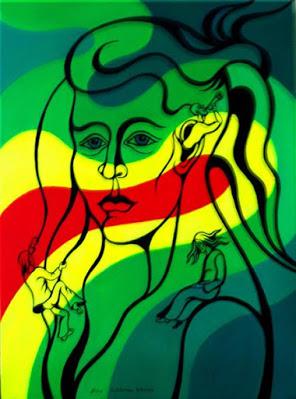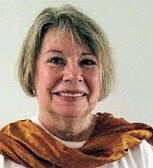by Nina

I See, I Feel, I Hear, I am Alive
by Nina Tokhtaman Valetova
Nina: Thanks so much, Lynn, for the interviews you did with me about Yoga and Anxiety, Yoga and Depression, and Yoga and Anger. Today I’d love to hear your thoughts about grief.
Grief is such a complicated emotion, I think. It seems to me that people can experience this emotion—or maybe this set of emotions—very differently from one another, and that grief may not always feel like sorrow. From your perspective, how do you understand grief?
Lynn: Grief follows loss; the griever feels broken, like a tree killed by a hatchet. With time, branches and leaves can grow on the tree’s stump, grief changes to sorrow, and the heart softens and stays open. Alternatively, grief can be unchanged, the tree stump dies, and the heart becomes frozen, perhaps bitter; the heart stays closed for what feels like protection. Mourning calls for courage.
Nina: Although people tend to think of grief as a feeling we have after the death of a loved one, is this a feeling we can have over other losses? And do people tend to feel more grief during times of change?
Lynn: Death of a loved one, a parent, a spouse, a friend, a child worst of all, brings grief, of course. At other times the lost loved one is the self, lost through many little deaths, such as bodily change, cognitive harm, or social disability. Accustomed ways of being or doing disappear.
Right now, we are all suffering many little deaths. Covid-19 has produced a world of loss. We are grieving, but not yet able to metabolize our grief into sorrow. We live in between. Covid-19 has changed out world; our past is disappeared, our present is ambiguous, our future is unknown. What happens next?
Nina: I’ve heard from various experts, including a death doula and a hospice nurse, that grief needs to run its course. They say it needs to be felt completely and given as much time as it needs. What do you think about that?
Lynn: Grieving is an organic process that needs to run through the body/mind in its own way and its own time, and like a deep yoga practice it effects every cell.
Nina: How can yoga support us while we are moving through grief?
Lynn: Yoga helps us stay in the moment while realizing that moments are temporary and so are we. We learn to be patient with pain and not jump away from it or from ourselves, to endure, to treasure joy, to know life and all things are fleeting.
Nina: What are some of your favorite poses and practices for helping people who are experiencing grief?
Lynn: A full yoga experience of whatever style wakes you up to your feelings and attaches you to your body/mind is key. Child’s pose and Yoga Nidra, after your body has been reached and relaxed, are ways to live with your grief, and then much later, cultivate contentment.
Nina: My own experiences with grief felt a lot like stress, maybe stress mixed with sorrow. If you’re experiencing stress, anxiety, depression, or anger as a part of your grief, does it make sense to use yoga techniques that might help with those emotions?
Lynn: Yes, seek whatever yoga feels appropriate, from strenuous to restorative. Forceful movements can release anger. Breathing techniques reduce anxiety and depression. We feel stress mixed with our sorrow because we are breaking open. Yoga Nidra and Savasana can help people feel protected so that they can grieve safely.
Yoga helps us recognize and accept who we are, where we are. Most of us have had the experience of suddenly sobbing during practice, or remembering, realizing, understanding something that we weren’t even conscious of thinking about. Yoga helps us open and connect with our deepest emotions.
Nina: Can people get stuck in their grief? If so, how someone tell? And can yoga help with that?
Lynn: Grief can become an endless cycle of remorse and pain, recriminations of whys and wherefores, repetitive and going nowhere. Sometimes people feel it is disloyal not to remain in grief. Not so.
Nina: Are there any yoga practices and/or poses that people who are grief should avoid?
Lynn: Proceed with your whole heart into the practice that calls to you. Do not avoid your grief, sorrow will come and your heart will open to find space for joyfulness sometimes, too.
Nina: Is there anything else you’d like to say to our readers about this topic?
Lynn: “Practice and all is coming…” This is a phrase often spoken by Sri K. Pattabhi Jois.
Lynn Anjali Somerstein, PhD, NCPsyA, LP, RYT, is a licensed psychotherapist and yoga therapist in private practice, specializing in anxiety, depression and PTSD. She is also the author of numerous articles about yoga, anxiety, attachment issues and psychotherapy. Lynn is grateful to her many teachers at the Integral Yoga Institute and the National Psychological Association for Psychoanalysis who offered her extensive and deep training in yoga, yoga therapy, and psychoanalysis. See lynnsomerstein.com for more information about Lynn.
This post originally appeared on the Accessible Yoga Blog.
Subscribe to Yoga for Healthy Aging by Email ° Follow Yoga for Healthy Aging on Facebook ° To order Yoga for Healthy Aging: A Guide to Lifelong Well-Being, go to Amazon, Shambhala, Indie Bound or your local bookstore.

